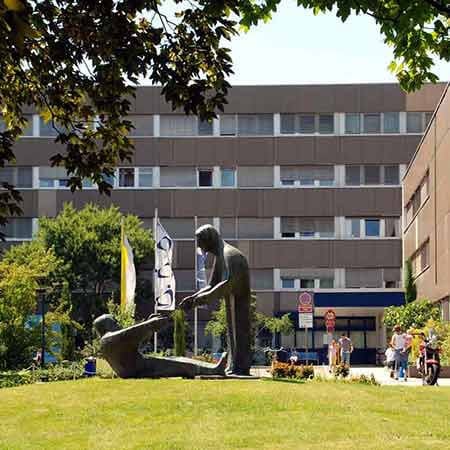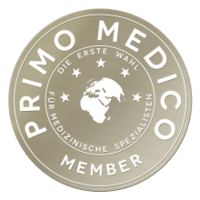Liver Cancer — Chemotherapy: treatment in the Best Hospitals of Germany
Treatment prices are regulated by national law of the corresponding countries, but can also include additional hospital coefficients. In order to receive the individual cost calculation, please send us the request and medical records.

Department of Oncology
The Department of Oncology offers high-precision diagnostics and comprehensive treatment of oncological diseases, including palliative care for patients with terminal stages of malignancies. The specialized Cancer Center Berlin-Buch also operates on the basis of the department, which allows treating patients in interdisciplinary cooperation with the involvement of various specialists. The doctors of the department have rich experience in treating patients with oncopathologies, and also have a perfect command of all the modern and most effective therapeutic methods. The department is certified in accordance with the standards of the German Cancer Society.



Department of Hematology and Oncology
The Department of Hematology and Oncology treats solid malignant tumors of various localizations, blood cancer, and benign hematopoietic pathologies. A qualified team consisting of oncologists, hematologists, psycho-oncologists, physiotherapists, and experienced nursing staff takes care of the health of patients. Whenever required, doctors from related medical fields are also involved in the therapeutic process. All specialists make every effort to provide patients with effective and personalized medical services while surrounding them with care. The department is part of the Cancer Center of the hospital, which is certified according to the requirements of the German Cancer Society (DKG). The department prefers a multidisciplinary approach, holding weekly tumor boards with the participation of oncologists, hematologists, radiation therapists, and surgeons, as well as highly specialized experts in gynecology, urology, gastroenterology, pulmonology, etc. The department's specialists have in their arsenal modern treatment methods for malignant diseases, including chemotherapy, targeted therapy, immunotherapy, hormone therapy, and many others. Patients with advanced stages of cancer are offered palliative care aimed at alleviating pain syndrome and ensuring a decent quality of life.




Department of Oncology and Palliative Care
The Department of Oncology and Palliative Care provides palliative treatment for patients with incurable diseases. The goal of the department's physicians is to alleviate the symptoms of the disease and improve the quality of life. The department's specialists take an individual approach to each patient, always respecting the patient's wishes. A competent multidisciplinary team, consisting of palliative care specialists, nurses, psycho-oncologists, physiotherapists and social workers, works here for the benefit of the patients.




Liver cancer is considered one of the most dangerous oncological diseases. Radical surgery is rarely used to treat it because most tumors are inoperable at the time of diagnosis. In such cases, chemotherapy becomes one of the main treatment options. It can be given in different ways. Liver cancer can be treated not only with standard systemic chemotherapy, but also with regional chemotherapy and hepatic arterial chemoembolization.
Content
- When can chemotherapy be used?
- Types of chemotherapy for liver cancer
- Systemic chemotherapy
- Regional chemotherapy
- Chemoembolization
- Treatment in Germany with Booking Health
When can chemotherapy be used?
Most cancers are treated with chemotherapy after surgical removal of the tumor to reduce the risk of recurrence. However, drugs are not used for this purpose in the case of liver cancer. This is because studies show that chemotherapy has no significant effect on the patient's life expectancy.
Therefore, this treatment may be considered in the following cases:
- localized inoperable cancer;
- metastatic liver cancer;
- recurrent cancer after surgery.
Chemotherapy slightly increases the chances of recovery from cancer if it is used for inoperable carcinomas. Chemotherapy drugs can sometimes shrink the tumor to such an extent that the doctor can remove it. This treatment is usually combined with immunotherapy, targeted therapy, and radiation therapy.
Types of chemotherapy for liver cancer
There are three main types of chemotherapy for liver cancer:
- systemic chemotherapy;
- regional chemotherapy;
- hepatic artery chemoembolization.
Systemic chemotherapy
Systemic chemotherapy is the standard treatment option for most malignant tumors. This procedure involves the oral or intravenous administration of chemotherapy drugs that enter the bloodstream and are distributed throughout the body. Therefore, this method works at any stage of liver cancer, regardless of the presence or absence of metastases, or their localization.
This treatment is carried out in cycles. Chemotherapy causes many side effects. It is, therefore, necessary to wait until the next cycle for the body to recover. As a rule, a combination of at least two drugs should be used. A combination of three drugs is more effective, but not all patients can tolerate this treatment well.
Regional chemotherapy
Regional chemotherapy involves injecting drugs into the hepatic artery that supplies blood to the tumor. This allows for a high dose of the drug to be delivered to the cancer cells.
Regional chemotherapy has proven to be more effective than systemic chemotherapy. However, it also has its disadvantages. The treatment requires a surgical intervention. In addition, the drugs do not have a systemic effect. This is good because it does not cause many side effects. However, the disadvantage is that the drugs have almost no effect on tumor metastases.
During treatment, the doctor places a special device under the skin of the abdomen, into which the drug is injected. This device is connected to the hepatic artery through a catheter. The drug slowly enters it and reaches the tumor cells, killing them off. This type of chemotherapy helps to shrink the size of the tumor. It can sometimes allow for the localized stage of liver cancer to become operable, and the doctor can then perform radical surgery.
Chemoembolization
This method is widely used in German medicine. It is very effective because it combines the advantages of embolization and chemotherapy.
Most of the liver is supplied with blood from the portal vein. However, the tumor is mainly fed by the hepatic artery. During chemoembolization, this blood vessel is blocked by emboli. As a result, the blood supply is drastically decreased, and the tumor suffers from a lack of oxygen and nutrients, which causes it to shrink. The effect is further enhanced by the use of chemotherapeutic agents. These are gradually released from the emboli and affect the cancer cells.
Treatment in Germany with Booking Health
The specialists at Booking Health are ready to help you take advantage of all the benefits of German medicine and undergo chemotherapy for liver cancer in Germany. Feel free to contact us now. We'll organize your treatment in one of the country's oncology clinics. The benefits of using our services are as follows:
- Selection of a cancer center in Germany with a focus on chemotherapy for liver cancer.
- Reduced prices for medical procedures by up to 50% due to the absence of extra charges and coefficients for international patients.
- Appointments at the oncology clinic for your preferred dates.
- Preparation of a liver cancer treatment plan in Germany based on your previous diagnostic examinations.
- Direct communication with German oncologists.
- Monitoring of all stages of the chemotherapy program in Germany.
- Checking the cost for the completed treatments and the return of unused funds.
- Organization of additional diagnostics or treatment for liver cancer in Germany.
- Buying and forwarding medicines for cancer treatments to your native country.
- Communication with the clinic after the completion of chemotherapy in Germany.
We will take care of all your organizational needs: arrangements with the clinic, help with the preparation of documents, purchase of flight tickets and booking of a hotel, transfer from the airport to the clinic and back.
Authors:
The article was edited by medical experts, board certified doctors Dr. Nadezhda Ivanisova and Dr. Vadim Zhiliuk. For the treatment of the conditions referred to in the article, you must consult a doctor; the information in the article is not intended for self-medication!
Our editorial policy, which details our commitment to accuracy and transparency, is available here. Click this link to review our policies.
Sources:

